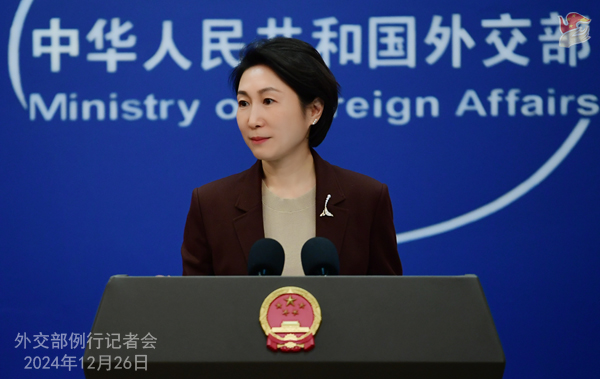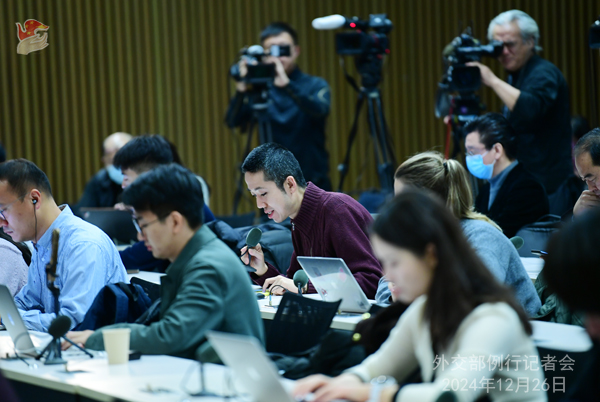
CCTV: On December 25, Foreign Minister Wang Yi had talks with Japanese Foreign Minister Takeshi Iwaya who was on a visit to China. Could you share more details with us?
Mao Ning: Basically speaking, the Chinese and Japanese foreign ministers had cordial, positive and constructive talks. They focused on delivering on the important common understandings reached between President Xi Jinping and Prime Minister Shigeru Ishiba when they met in Lima, and had productive communication on comprehensively advancing the strategic relationship of mutual benefit and building a constructive and stable China-Japan relationship fit for the new era. The two foreign ministers agreed that China-Japan relations have gone far beyond the bilateral scope. Both sides should continue having exchanges and cooperation at various levels and through multiple channels, enhance mutual understanding and trust, properly handle disagreements and differences, and promote the sound and steady growth of bilateral relations on the right track. A readout was released on the specifics of the talks, which you may refer to.
China Daily: On December 25, the second meeting of the China-Japan High-Level Consultation Mechanism on People-to-People and Cultural Exchanges was held in Beijing. Can you share more details with us?
Mao Ning: On December 25, Member of the Political Bureau of the CPC Central Committee and Minister of Foreign Affairs Wang Yi and Japanese Foreign Minister Takeshi Iwaya co-chaired the second meeting of the China-Japan High-Level Consultation Mechanism on People-to-People and Cultural Exchanges in Beijing. China’s Minister of Culture and Tourism Sun Yeli and Japan’s Minister of Education, Culture, Sports, Science and Technology Toshiko Abe and other heads of competent authorities of the two countries attended the meeting. The two sides took stock of their progress in people-to-people and cultural exchanges since the first meeting and reached 10 agreements on exchanges and cooperation in such areas as youth, education, tourism, sister cities, sports, cultural and entertainment industries, media and think tanks, women, etc. It is hoped that the two sides will take this meeting as an opportunity to expand and enrich bilateral exchanges, create a healthy and rational environment of public support, develop right and objective mutual perception, build more bridges of friendly interaction between the two peoples to promote the healthy and stable development of China-Japan relations.
Global Times: In a statement released on December 24, the Philippine Defence Secretary Gilberto C. Teodoro, Jr. said the deployment of US Typhon mid-range missile system to the Philippines in the context of joint exercises is legitimate and legal. The Philippines is a sovereign state, not any country’s “doorstep.” Any deployment and procurement of assets related to the Philippines’ security and defense fall within its own sovereign prerogative and are not subject to any foreign veto. The enhancement of Philippine defense capabilities in accordance with the so-called Comprehensive Archipelagic Defense Concept (CADC) is undertaken on the basis of the Philippines’ own national interest and in accordance with its independent foreign policy. It is not targeted against specific countries. Instead, it is targeted against security threats, and challenges. He added that while China is criticizing the capability development of the Philippines, they are continuously building up their nuclear arsenal and ballistic missile capability. What’s China’s comment?
Mao Ning: Regarding the US deployment of Mid-Range Capability (MRC) missile system in the Philippines, China has stated its firm opposition on multiple occasions. Let me stress that the Typhon MRC missile system can carry either conventional or nuclear warheads. It is not a defensive weapon, but a strategic and offensive one. The Philippines has worked with the US to bring in the Typhon system. It’s placing its national security and defense in the hands of others, introducing geopolitical confrontation and risk of arms race into the region and posing a real threat to regional peace and security. Whose interest does this move serve? How could anyone believe this is independent foreign policy? What the Philippines is doing benefits no one.
The Philippines once clearly promised that it will not choose sides between major countries, not engage in any activities that will harm China’s interest and doesn’t intend to incite tensions in the region. Despite these clear promises, however, the Philippines has helped country outside the region deploy military forces and stoke confrontation in the region. The Philippines said openly that the Typhon system was only used during Balikatan and Salaknib exercises and will be shipped out of the country in September following the military exercises. But then the Philippine side went back on its word, saying they would like to have the Typhon here in the Philippines forever and even plan to acquire the systems. This is a deliberate breach of the Philippines’ own words.
Who’s been making provocations and stirring up trouble in the South China Sea? Who’s been cooperating with external forces to flex muscle? Who’s broken the international law and yet claims to uphold it? The answer is quite clear to countries in the region. We once again urge the Philippines to bear in mind that the only right way to safeguard national security is to uphold strategic independence, good-neighborliness and friendship, and peaceful development. We once again call on the Philippines to heed the call of regional countries, quickly pull out the missile system as publicly pledged, and stop aggravating its wrongful act. Some individuals in the Philippines need to correct their understanding, reflect on their own words and deeds, and stop inverting the truth and pretending to be the victim.
Our message to the Philippines: China will not sit on its hands when its security interests are in danger or under threat. The Philippines will be hurting its own interests if it keeps refusing to change course.
